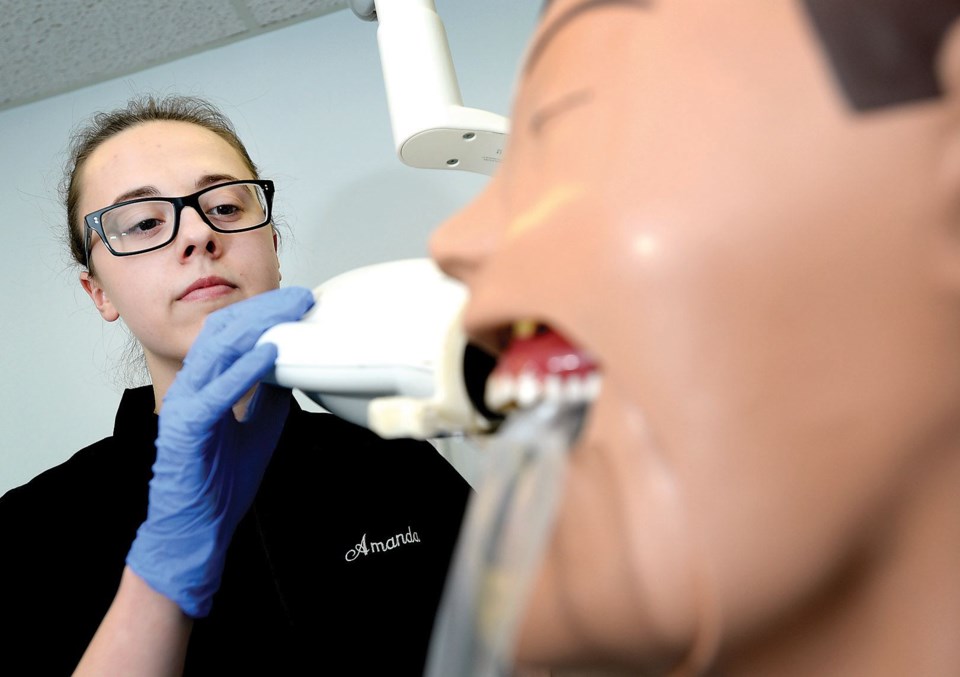The College of New Caledonia's board voted Friday to suspend its dental hygiene program for at least another year.
The one-year dental assisting program will continue, but without the one-time funding envelope of $268,000 from the Ministry of Advanced Education that helped save it last year.
Board chair Vince Prince said the college is facing a likely budget shortfall this year and while the education council has been working on updating the program, it wasn't guaranteed to get the provincial approval.
"It's a slow process and really we cannot afford to continue to run the program as it was," he said.
When the two-year dental hygiene program suspension was announced in April to help counteract its $2.8 million deficit, the board stressed its plan was for a one-year hiatus to hopefully only affect the September 2015 intake.
"Our goal was to have it back by 2016, but it didn't happen that way," Prince said. "Really until we can get the education council to finish the work that needs to be done, we can't even say unfortunately. We faced a lot of criticism and a lot of push-back from the community and I understand that."
The college declined to comment Wednesday, but sent a press release Thursday morning to say plans are ongoing to reintroduce the program "in the near future."
"The revised Dental Hygiene curriculum has also been sent to the Ministry of Advanced Education for review and approval. The Ministry will need to determine whether a revised tuition is appropriate for the revised Dental Hygiene curriculum," CNC's statement said, also noting it consulted with faculty and the District Dental Society about the "re-introduction process."
Sheldon Clare, faculty representative and history instructor, said the real issue is provincial funding.
"Quite frankly the college is not being funded sufficiently to meet the demands of the programs we offer," said Clare, who voted against the recommendation.
"That's the problem because once a program is cut it's pretty hard to bring it back and you lose the expertise in the faculty. People don't stand around in stasis waiting for a program to be reinstated."
The move will likely lead to more layoffs, as some dental hygiene instructors were retained to finish teaching the current second-year students. But next year, there will be no dental hygiene students to teach.
"Faculty have worked hard to make improvements and it's very disappointing," said Clare, who noted the program was always full and led to skilled jobs, often for female students.
Nathan Giede, student representative echoed Clare's criticism of funding levels, something he noted doesn't match inflation.
And though he said he understands the choice to suspend and re-make the program so the college can increase tuition, he doesn't think it will solve the problem.
"Essentially the argument is the cost of the program is too low," he said.
"I fundamentally disagree with that. Us jacking up our fees is not going to solve the problem. If government wants more of any kind of trade or specialty to appear in a given region, they're going to need to step up and give their end of the bargain," said Giede, who is also a weekly columnist for the Prince George Citizen.
"Students aren't dumb. They know things cost money and it increases over time," he said, but "they also want to see an endgame that's sustainable."
Prince said he wasn't happy to continue the program's suspension, but the college couldn't afford it when the college faces increasing costs without a similar increase in funding levels.
"It's very tough to continue to run the facilities and all the programs all at the same amount year after year without having to make some changes," Prince said.
Giede sees suspending the program as a catch-22.
While it may save money now, it could make it much harder to rebuild.
"All education systems have this kind of problem where students can be quite unpredictable.
"Anytime you are unpredictable, students are hyper-rational market thinkers," he said.
"They will choose other markets."
Prince said even with tough decisions, it's important they are made by people in the community rather than through oversight in Victoria.
"We struggle with it every single time and unfortunately we end up impacting people one way or another.
"But we help a lot of people too," said Prince, who is himself a CNC graduate.
"We're trying to make sure that we continue with the work of education. That's our biggest goal."



